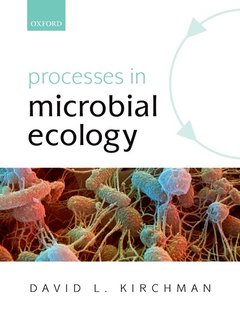Description
Processes in microbial ecology
Author: Kirchman David L.
Language: English
Subjects for Processes in microbial ecology :
Approximative price 126.30 €
In Print (Delivery period: 14 days).
Add to cart
Publication date: 02-2012
368 p. · 19.5x25.3 cm · Hardback
368 p. · 19.5x25.3 cm · Hardback
Description
/li>Contents
/li>Biography
/li>
Microbial ecology is the study of interactions among microbes in natural environments and their roles in biogeochemical cycles, food web dynamics, and the evolution of life. Microbes are the most numerous organisms in the biosphere and mediate many critical reactions in elemental cycles and biogeochemical reactions. Because microbes are essential players in the carbon cycle and related processes, microbial ecology is a vital science for understanding the role of the biosphere in global warming and the response of natural ecosystems to climate change. This novel textbook discusses the major processes carried out by viruses, bacteria, fungi, protozoa and other protists - the microbes - in freshwater, marine, and terrestrial ecosystems. It focuses on biogeochemical processes, starting with primary production and the initial fixation of carbon into cellular biomass, before exploring how that carbon is degraded in both oxygen-rich (oxic) and oxygen-deficient (anoxic) environments. These biogeochemical processes are affected by ecological interactions, including competition for limiting nutrients, viral lysis, and predation by various protists in soils and aquatic habitats. The book neatly connects processes occurring at the micron scale to events happening at the global scale, including the carbon cycle and its connection to climate change issues. A final chapter is devoted to symbiosis and other relationships between microbes and larger organisms. Microbes have huge impacts not only on biogeochemical cycles, but also on the ecology and evolution of more complex forms of life, including Homo sapiens..
Preface. 1. Introduction. 2. Elements, Biochemicals, and Structures of Microbes. 3. Physical-Chemical Environment of Microbes. 4. Microbial Primary Production and Phototrophy. 5. Degradation of Organic Material. 6. Microbial Growth, Biomass Production, and Controls. 7. Predation and Protists. 8. Ecology of Viruses. 9. Community Structure of Microbes in Natural Environments. 10. Genomes and Metagenomes of Microbes and Viruses. 11. Processes in Anoxic Environments. 12. The Nitrogen Cycle. 13. Introduction to Geomicrobiology. 14. Symbiosis and Microbes. References. Index.
Professor Dave Kirchman is the Maxwell P. & Mildred H. Harrington Professor of Marine Studies at the University of Delaware. He obtained his Ph.D. from Harvard University in 1982 before joining the faculty at the University of Delaware in 1986. He has edited two previous books and written 160 articles in peer-reviewed journals. He was Editor of Limnology and Oceanography for 5 years, and has served on the editorial boards for another eight journals. He has several years of experience teaching microbial ecology to undergraduate and graduate students with diverse backgrounds, including chemists and engineers, with little experience in microbiology.
© 2024 LAVOISIER S.A.S.
These books may interest you

Processes in Microbial Ecology 39.35 €

Processes in Microbial Ecology 121.51 €


